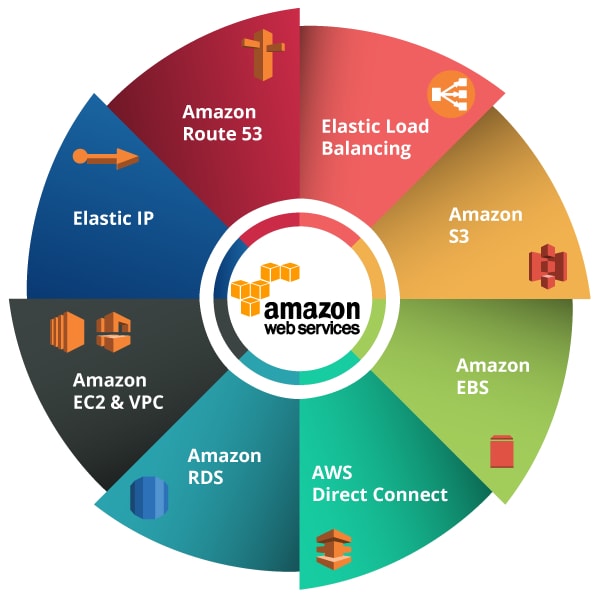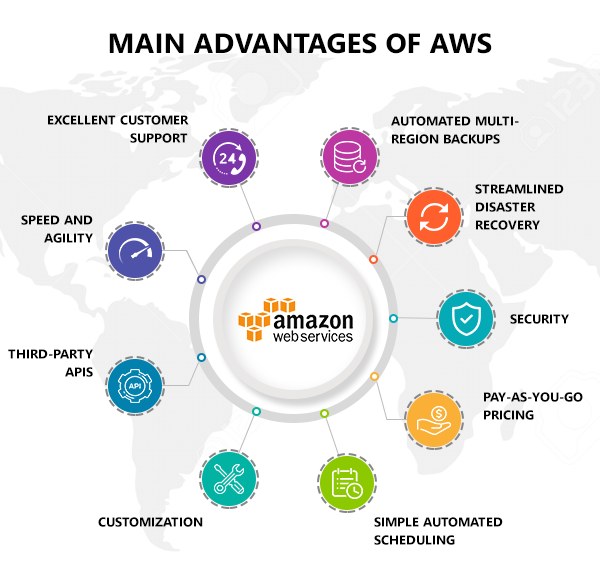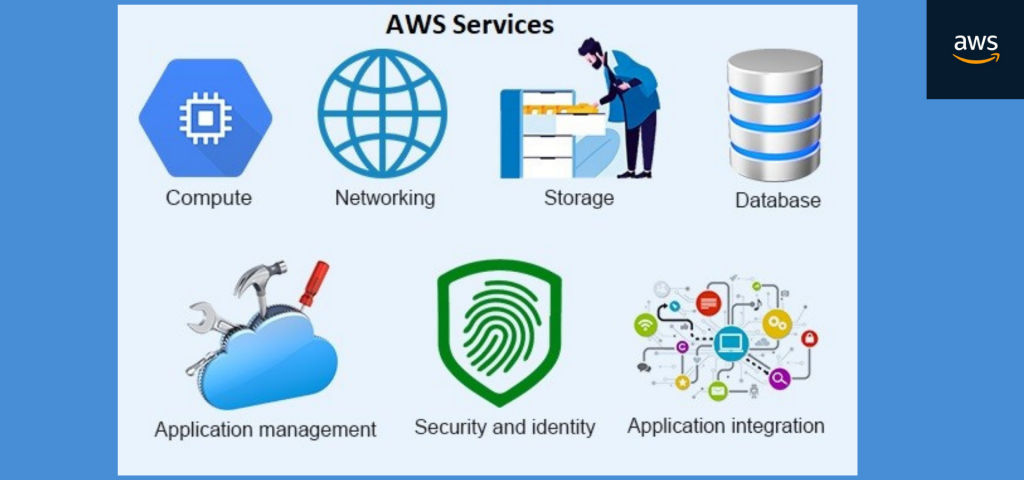Table of Contents
Introduction

AWS, or Amazon Web Services, is one of the most popular cloud computing platforms available today. With a wide range of products and services, it is used by businesses of all sizes to meet their computing needs. Whether you’re looking for scalable computing resources, reliable storage solutions, or robust security measures, it has something to offer.
What is AWS?

AWS is a cloud computing platform that provides a wide range of services, including hosting, storage, databases, security, and more. It was launched by Amazon in 2002 and has since become one of the largest cloud computing platforms in the world, serving businesses of all sizes and industries.
Scalability
One of the key benefits of AWS is its scalability. Companies can quickly and easily scale up or down their infrastructure and resources as their needs change, without having to worry about purchasing or maintaining physical hardware. This can save time and money, and help organizations be more agile in the face of change.
Cost-effectiveness
Another advantage of AWS is its cost-effectiveness. Companies only pay for the resources they use, and there are no upfront costs or long-term commitments. This can help organizations reduce their overall IT expenses, and avoid the costs associated with purchasing, maintaining, and upgrading physical hardware.
Security
AWS is also known for its security. The platform uses a variety of security measures to protect customer data, including firewalls, encryption, and access controls. Additionally, it has a team of security experts who are dedicated to maintaining and improving the security of the platform.
Service Offerings
AWS offers a wide range of services, including computing (EC2), storage (S3), databases (RDS), security (IAM), and many more. These services can help companies meet their specific technological needs and can be easily integrated with existing systems and applications.
Advantages

- Scalability: One of the biggest benefits of AWS is its scalability. With AWS, businesses can easily scale their computing resources up or down as needed, without having to worry about the limitations of their own infrastructure. This means that businesses can quickly respond to changing demands and remain competitive in the market.
- Reliability: Another major benefit of AWS is its reliability. it has multiple data centers around the world, so businesses can be confident that their data and applications are always available, even in the event of a disaster. This is particularly important for businesses that rely on the internet to conduct their operations.
- Security: AWS is also known for its robust security measures. With it, businesses can be confident that their data and applications are protected from cyber threats and other security risks. It provides a number of security features, such as encryption, identity and access management, and network security, to help businesses keep their data and applications secure.
- Cost-effectiveness: One of the biggest benefits of AWS is its cost-effectiveness. It provides a pay-as-you-go model, so businesses only pay for the resources they use. This makes it easy for businesses to budget for their computing needs, and can result in significant cost savings compared to traditional on-premise solutions.
- Innovation: Finally, AWS is known for its commitment to innovation. This is constantly introducing new products and services, so businesses can take advantage of the latest technology to meet their computing needs. This allows businesses to stay ahead of the curve and remain competitive in the market.
Components
- Amazon Elastic Compute Cloud (EC2) EC2 is the backbone of AWS and provides scalable computing capacity in the cloud. It enables users to launch and manage virtual machines in the cloud, known as instances, and allocate varying amounts of CPU, memory and storage resources to each instance. EC2 provides the ability to easily scale computing resources up or down based on demand.
- Amazon Simple Storage Service (S3) S3 is a highly scalable and durable object storage service that can be used to store and retrieve large amounts of data. It is designed to provide 99.999999999% durability and is a popular storage choice for backups, archives, big data and cloud-based applications.
- Amazon Relational Database Service (RDS) RDS is a managed database service that makes it easy to set up, operate and scale a relational database in the cloud. It supports multiple database engines, including MySQL, MariaDB, Microsoft SQL Server, Oracle and PostgreSQL, and eliminates the need for users to manage database servers.
- AWS Lambda AWS Lambda is a serverless computing platform that allows users to run their code without provisioning or managing servers. It automatically scales the computing resources needed to run the code and only charges for the actual compute time consumed. This makes it an ideal choice for applications that require on-demand computing resources.
- Amazon Virtual Private Cloud (VPC) VPC is a virtual network dedicated to a single AWS customer, providing full control over the virtual networking environment. It enables users to launch AWS resources into a virtual network and connect to the Internet and their own data centers through secure and private connections.
Services

In today’s digital landscape, cloud computing has become a vital aspect for businesses of all sizes. Amazon Web Services (AWS) is the leading cloud computing platform, offering a wide range of services for businesses to leverage. This blog will explore the comprehensive list of AWS services and how they can help businesses achieve their goals.
Compute Services:
- EC2 (Elastic Compute Cloud) – A scalable compute service that allows businesses to launch and manage virtual machines.
- Elastic Beanstalk – A fully managed service that makes it easy to deploy, run, and manage web applications.
- Lambda – A serverless compute service that runs your code without having to manage servers.
- EC2 Auto Scaling – Automatically scales compute capacity up or down based on demand.
- EC2 Container Service – A highly scalable, high-performance container management service that supports Docker containers.
Storage Services:
- S3 (Simple Storage Service) – A scalable, object-based storage service that is ideal for storing large amounts of data.
- EBS (Elastic Block Store) – Block-level storage volumes for use with EC2 instances.
- Glacier – A low-cost, long-term data archiving solution.
- Snowball – A petabyte-scale data transport solution that uses secure devices to transfer large amounts of data into and out of AWS.
Databases:
- RDS (Relational Database Service) – A managed relational database service that supports popular database engines like MySQL, Oracle, and Microsoft SQL Server.
- DynamoDB – A fully managed NoSQL database service that provides fast and predictable performance.
- Redshift – A fully managed, petabyte-scale data warehousing service.
Networking and Content Delivery:
- VPC (Virtual Private Cloud) – A logically isolated section of the AWS Cloud where businesses can launch AWS resources in a virtual network.
- Route 53 – A scalable and highly available Domain Name System (DNS) web service.
- CloudFront – A fast content delivery network (CDN) service that securely delivers data, videos, applications, and APIs to customers globally.
Application Services:
- SES (Simple Email Service) – A flexible, cost-effective, and scalable email service.
- SNS (Simple Notification Service) – A flexible, fully managed pub/sub messaging service for sending messages to multiple subscribers.
- SQS (Simple Queue Service) – A fully managed message queuing service for storing and retrieving messages.
- SWF (Simple Workflow Service) – A fully managed workflow service for building applications in which multiple steps are coordinated across multiple systems.
Security and Identity & Compliance:
- IAM (Identity and Access Management) – A secure and flexible service that enables businesses to manage access to AWS services and resources.
- Certificate Manager – A service that lets businesses easily manage SSL/TLS certificates for use with AWS services.
- WAF (Web Application Firewall) – A firewall service that helps protect web applications from common web exploits that could affect application availability, compromise security
Conclusion
In conclusion, AWS is a powerful cloud computing platform that provides organizations with a wide range of services, scalability, security, and cost-effectiveness. Whether you are a small business or a large enterprise, it has something to offer. By leveraging the platform, companies can streamline their IT operations, reduce costs, and stay ahead of the curve in the ever-evolving technological landscape.